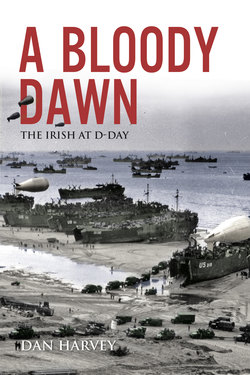Читать книгу A Bloody Dawn - Dan Harvey - Страница 10
На сайте Литреса книга снята с продажи.
ОглавлениеPREFACE
There had been other land invasions during the Second World War (North Africa, Sicily and Salerno among them) but D-Day 6 June 1944 was different. The Normandy landings were staggering in scope, and the history of warfare had never known a comparable amphibious invasion for its breath of conception, grandeur of scale and mastery of execution. Operation Overlord, the opening of the ‘second front’ against the German Army, was a bid to restore liberty to Nazi-occupied western Europe and laid the foundations of the Allied victory. This book is dedicated to the ‘D-Day Irish’, both native-born and of Irish descent, whose involvement on D-Day and in the Normandy Campaign must be acknowledged and not forgotten, and the values for which they fought must never be lost.
The reality there was the chaos. It was not that you were terrified, it was that you did not know where the Germans were; you did not know where your comrades were. You could not walk very fast, weighed down with heavy equipment, and because of the bad weather the reinforcements that were meant to come at 0900 hours that morning, about six hours after we jumped, did not arrive until 3pm, at which stage the main battles were over and you were either, dead, wounded or exhausted.
Lieutenant Leonard Wrigley (Waterford),
British 6th Airborne Division
As I parachuted down, the noise became overwhelming – machine guns, shells and mortars. It was impossible to tell who anyone was. I could see shapes but did not know if they were the opposition. By luck the place where I actually dropped was the very track that led to our Battalion RV [rendezvous] so I had no trouble finding it. Other chaps were dropped miles away, in areas inundated by Germans. Some landed in the flooded marshes and drowned!
Lieutenant Richard Todd (Dublin),
British 6th Airborne Division
Everything on board Landing Craft Tank [LCT] went according to plan; aerial photographs helping to identify beach landmarks. When approximately one mile offshore, the Officer Commanding [OC] and I spotted what we thought to be landmarks for Number One [No. 1] troop lane. Observation became more difficult as we approached the beach owing to the smoke caused by the bombardment. When we were about 500 yards offshore the smoke cleared and I observed that our craft was approximately opposite the point where I wanted to touch down, so I said this to the Landing Craft Commander and mounted my Assault Vehicle Royal Engineers [AVRE]. As the craft came on to the beach it veered to the starboard and touched down approximately 200 yards to the right of where I had hoped it would. The Troop [six tanks] then disembarked in order. This disembarkation took place in between three and four feet of water. The first tank proceeded up the beach and started flailing just above water level. I called him up and he said he suspected mines. Shortly after this there was an explosion and he stopped.
Captain Richard Cunningham (Waterford),
79th Assault Squadron Royal Engineers
I landed on D-Day in water waist deep and waded ashore in the midst of the most incredible sight in history. The fleet of ships was terrific and my first sight of France was a church steeple with a hole clean through the side of it – a German plane appeared, and as if by magic six of ours were on his tail and down he came.
Reverend Cyril Patrick Crean (Dublin),
Chaplain 29th Armoured Brigade
The Irish were not worried about the danger; they always went for the most dangerous jobs: tanks, tail-gunners and paratroopers. The paras were full of Irish.
Joe Walsh (Athy),
715 Motor Transport Light Repair Unit
We were well trained for it; we were trained all the time. It was just like an exercise in its own way; only the ones who went down didn’t get up again.
George Thompson (Belfast),
Royal Navy, attached to Commandos
The whole thing was to move fast, not to be an object for the snipers. They used to say, if you want to see your grandchildren then get off the landing craft faster than Jessie Owens [Olympic sprinter]. Seemingly I was fast.
Private Pat Gillen (Galway and Cork),
British 6th Commando Brigade
